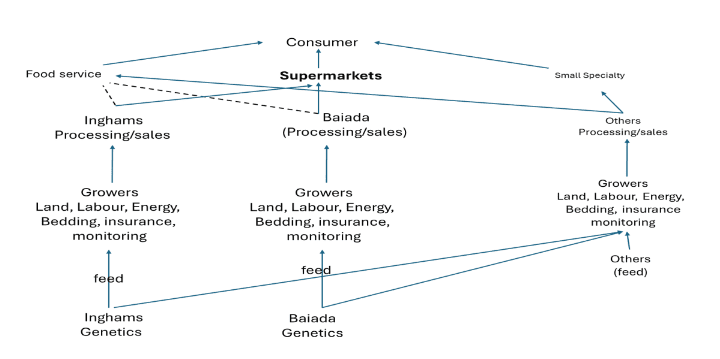Australia: ABARES to have latest gander into chicken-meat industry

ABARES has been commissioned to conduct an independent review into the relationship between growers and integrated producers in the Australian chicken meat supply chain.
It will follow on from the National Farmers Federation final report released in April 2024 into potential for an industry code of conduct, which found that a mandatory code was the only way to address issues in the poultry sector.
NSW Farmers has warned the review will only delay work to solve problems faced by producers.
“We’ve already conducted extensive investigations into the poultry meat supply chain, and the findings were crystal clear – processors are giving growers the raw end of the deal, and it is forcing them out of the industry,” NSW Farmers principal economistSam Miller said in a statement.
Implied is the impact of Australia’s chicken supply chain being held by two dominating forces, Baiada and Ingham’s, which the Australian Chicken Growers’ Council says supply around 70 percent of Australia’s chicken.
The ABARES review will examine whether there is evidence of market failure within the industry, and if so, potential actions that could be introduced, as applicable.
The review will also consider information contained in recent inquiries into the industry, as well as examining the industry’s evolution over time.
ABARES plans to release an issues paper and provide a draft report for stakeholder review and comment by mid-2025 ahead of a final report being delivered to government for consideration.
Following the imminent release on an information paper, ABARES will seek information and evidence from stakeholders via the Have Your Say online portal.
ABARES will also conduct stakeholder engagement across all major parts of the chicken meat industry.
ABARES will provide a draft report for stakeholder review and comment by mid-2025 with a final report to government due as soon as practicable thereafter.
ABARES executive director Jared Greenville said ABARES was well placed to undertake this review as an independent economic research body within the Department of Agriculture, Fisheries and Forestry.
“The poultry industry is a vital and growing component of Australia’s agricultural sector with production value expected to reach a record $4.2 billion this financial year,” Dr Greenville said.
Terms of reference for the ABARES review include potential regulatory and non-regulatory responses available to government if market failure or other significant issues are found to exist.
New South Wales produces around 35 percent of Australia’s chicken meat, making it the largest poultry-producing state in Australia.
Australian Bureau of Statistics counts-of-business data indicates a 27 percent fall in the number of poultry farmers in NSW from 450 in 2011 to less than 350 in 2024.
“This shows a persistent downward trend in poultry businesses in NSW,” Mr Miller said.
The drop in producers goes against the national uptrend in poultry production, up 43pc from 1,014,900t in 2010-11 to 1,449,000t in 2023-24.
NSW Farmers principal economist Sam Miller said further research into the industry would not produce any surprises and it was time for reform, not reports, to address the significant market power misuse impacting poultry farmers across the nation.
“There is little to no choice in processors, growing contract terms are unfair, and there is a deliberate undermining of collective bargaining efforts within the supply chain..
“This sector doesn’t need another report, it needs real reform to address these problems before more farmers are forced to shut up shop, and there’s not enough Aussie chicken for those budget-friendly family meals we all rely on.”

Figure 1. Flow chart of poultry meat supply chain showing how major processors bookend most growers. Source: Australian Chicken Growers’ Council
To improve conditions for poultry farmers into the future, Mr Miller said it was imperative a mandatory code of conduct was established to govern growers, processors and supermarkets operating within the poultry industry.
“Having a mandatory code of conduct enforced by the Australian Competition and Consumer Commission would support fair trading as well as best practice policy and regulation of supermarkets and processors within the poultry meat industry,”
“For poultry farmers, this code could mean more power to negotiate and better enforceability of contracts in the chicken meat supply chain ‒ meaning a fairer deal at the farm gate.
“With the cost of living the single biggest election issue, politicians must commit to implementing this code of conduct quickly to secure the future of this important family dinner staple.”
For almost 30 years of expertise in the agri markets, UkrAgroConsult has accumulated an extensive database, which became the basis of the platform AgriSupp.
It is a multi-functional online platform with market intelligence for grains and oilseeds that enables to get access to daily operational information on the Black Sea & Danube markets, analytical reports, historical data.
You are welcome to get a 7-day free demo access!!!
Read also
Turkish Ports Added to UkrAgroConsult LineUp Reports
India extends wheat stock limits to ensure food security
Jordan issues tender to purchase up to 120 thsd tons of wheat
Large wheat remnants from the old harvest limit the potential for price growth
Indonesia seeks greater influence on global palm oil prices through biofuel expansion
Write to us
Our manager will contact you soon



